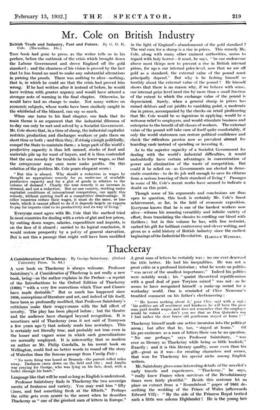Mr. Cole on British Industry
British Trade and Industry, Past and Future. By U. D. H. Cole. (dhtemillan. 16s.) Tins book had gone to press, as the writer tells us in his preface, before the outbreak of the crisis which brought down the Labour Goverrunent and_ drove England off the gold standard ; and the clearness of his vision is proved by the fact that he has found no need to make any substantial alterations in passing the proofs. There was nothing to alter—nothing, that is, in which he could see that the crisis had proved him wrong. If he had written after it instead of before, he would have Written with greater urgency_ and would have uttered a stronger note of warning in the final chapter. Otherwise, he Would have had no change to make. Not many writers on Economic. subjects, whose works have been similarly caught in
whirlaind of the blizzard, can say so much.
When one turns to his final chapter, one fords that its main theme is an argument that the industrial dilemma of to-day can only be met and solved by a Socialist Government. Mr. Cole showS that, in a time of slump, the industrial capitalist restricts_ riroduction.and discharges workers or puts them on short time or both ; .and then if stionielioligh-Politfeally; compel the State to maintain them,; a large part of the world's productive capacity, is thus left unused, stocks of .food and materials pile up for want of buyers, and it is then contended that the one remedy for the trouble is to lower wages, so that the entrepreneur may once more make profits. On this solution of the problem Mi. Cole pours eloquent scorn.: " But this is absurd. Why should a reduction in wages be thought an appropriate remedy for au under-use of available productive capacity and for a glut of goods in relation to the volume of demand ? Clearly the true remedy is an increase in demand, arid not a reduction. But no one country, working under capitalist, conditions of international competition, can apply this remedy, without putting itself at a competitive disadvantage. If other countries reduee their wages, it must do the same, or lose trade, which it cannot afford to do if it depends largely on exports to pay for imports vital to its productivity and its way of living."
Everyone must agree with Mr. Cole that the method tried in most countries for dealing with a crisis of glut and low prices, by cutting down wages, salaries, expenditure and imports, ,is on the face of it absurd ; carried to its logical conclusion, it would restore prosperity by a poEcy of general starvation. But is not this a passage that might well have been modified in the light of England's abandonment of the gold standard ? The real cure for a slump is a rise in prices. This remedy Mr. Cole, along with many, other eminent authorities, seems to regard with holy horror—it must, he says, " be our endeavour above most things now to prevent a rise in British internal prices, for upc it our internal price-level, now that we are off gold as a standard, the external value of the pound must principally depend." But why is he fashing himself so terribly about the external value of the pound ? He himself shoWs that there is no reason why, if we behave with sense, our internal price level need rise by more than a small fraction of the extent to whieli 'the exchange value of the pound is depreciated: Surely, when a general slunip in prices has mined debtor's and cut profits to vanishing point, a moderate rise in prices, accompanied by the checks on retail profiteering that Mr. Cole would be so ingenious in applying, would be a welcome relief to employers, and would stimulate business and enterprise to the benefit of all classes of workers. The external value of the pound will take care of itself quite comfortably, if only the world statesmen can restore political confidence and cheek the' ridiculous passion now so prevalent abroad for hoarding Cash'instead of spending or investing it.
As- to the superior capacity of a &socialist Government for dealing with the world's industrial difficulties, it would undoubtedly have certain advantages in concentration of power and elimination of the waste of competition. But could it be relied on—as Governments arc elected in demo- cratic countries—to do its job well enough to save its citizens from a serious lowering of their standard of living ? Passages in some of Mr. Cole's recent works have seemed to indicate a doubt on this point.
Though some of his arguments and conclusions are thus open to question, this book is certainly Mr. Cole's finest achievement, so far, in the field of economic exposition. Everyone knows that he is one of the hardest workers now alive—witness his amazing versatility and infinite variety of effort, from translating the classics to curdling our blood with thrillers ; but in this volume he has, with line restraint, curbed his gift for brilliant controversy and clever writing, and given us a solid history of British industry since the earliest beginnings of the Industrial Revolution. 71
,ARTMY WITHERS.






































 Previous page
Previous page